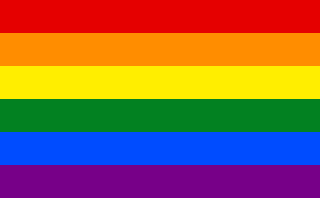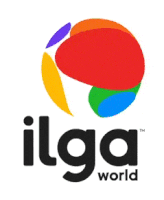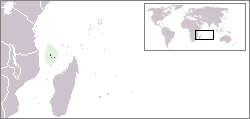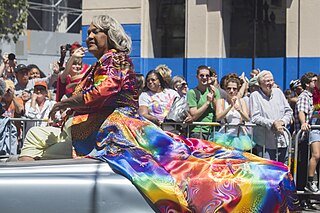
Lesbian, gay, bisexual, and transgender (LGBT) movements are social movements that advocate for LGBT people in society. Although there is not a primary or an overarching central organization that represents all LGBT people and their interests, numerous LGBT rights organizations are active worldwide. The first organization to promote LGBT rights was the Scientific-Humanitarian Committee, founded in 1897 in Berlin.

LGBT is an initialism that stands for "lesbian, gay, bisexual, and transgender". It may refer to anyone who is non-heterosexual, non-heteroromantic, or non-cisgender, instead of exclusively to people who are lesbian, gay, bisexual, or transgender. A variant, LGBTQ, adds the letter Q for those who identify as queer or are questioning their sexual or gender identity. Another variation, LGBTQ+, adds a plus sign "represents those who are part of the community, but for whom LGBTQ does not accurately capture or reflect their identity". Many further variations of the acronym exist, such as LGBT+, LGBTQIA+, and 2SLGBTQ+. The LGBT label is not universally agreed to by everyone that it is generally intended to include. The variations GLBT and GLBTQ rearrange the letters in the acronym. In use since the late 1980s, the initialism, as well as some of its common variants, functions as an umbrella term for marginalized sexualities and gender identities.

The International Lesbian, Gay, Bisexual, Trans and Intersex Association (ILGA) is a LGBTQ+ rights organization.

Lesbian, gay, bisexual, and transgender (LGBT) people in Comoros face legal challenges not experienced by non-LGBT residents. LGBT persons are regularly prosecuted by the government and additionally face stigmatization among the broader population.

LGBT movements in the United States comprise an interwoven history of lesbian, gay, bisexual, transgender and allied social movements in the United States of America, beginning in the early 20th century. A commonly stated goal among these movements is social equality for LGBT people. Some have also focused on building LGBT communities or worked towards liberation for the broader society from biphobia, homophobia, and transphobia. LGBT movements organized today are made up of a wide range of political activism and cultural activity, including lobbying, street marches, social groups, media, art, and research. Sociologist Mary Bernstein writes: "For the lesbian and gay movement, then, cultural goals include challenging dominant constructions of masculinity and femininity, homophobia, and the primacy of the gendered heterosexual nuclear family (heteronormativity). Political goals include changing laws and policies in order to gain new rights, benefits, and protections from harm." Bernstein emphasizes that activists seek both types of goals in both the civil and political spheres.

Lesbian, gay, bisexual, and transgender (LGBT) rights in Mauritius have expanded in the 21st century, although LGBT Mauritians may still face legal difficulties not experienced by non-LGBT residents. Prior to 2023, sodomy was criminalized by Section 250 of the Criminal Code. However, Mauritius fully decriminalized homosexuality in October 2023. Although same-sex marriage is not recognized in Mauritius, LGBT people are broadly protected from discrimination in areas such as employment and the provision of goods and services, making it one of the few African countries to have such protections for LGBT people. The Constitution of Mauritius guarantees the right of individuals to a private life.
Lesbian, gay, bisexual, transgender (LGBT) affirming denominations in Judaism are Jewish religious groups that welcome LGBT members and do not consider homosexuality to be a sin. They include both entire Jewish denominations, as well as individual synagogues. Some are composed mainly of non-LGBT members and also have specific programs to welcome LGBT people, while others are composed mainly of LGBT members.
Australia is one of the most LGBT-friendly countries in the world. In a 2013 Pew Research poll, 79% of Australians agreed that homosexuality should be accepted by society, making it the fifth most supportive country in the survey behind Spain (88%), Germany (87%), and Canada and the Czech Republic. With a long history of LGBT rights activism and an annual three-week-long Mardi Gras festival, Sydney is considered one of the most gay-friendly cities in the world.

Intersex civil society organizations have existed since at least the mid-1980s. They include peer support groups and advocacy organizations active on health and medical issues, human rights, legal recognition, and peer and family support. Some groups, including the earliest, were open to people with specific intersex traits, while others are open to people with many different kinds of intersex traits.
Kaleidoscope Human Rights Foundation is a non-governmental organisation based in Australia that works to protect the rights of LGBTQIA+ people in the Asia Pacific region.
This is a timeline of notable events in the history of non-heterosexual conforming people of Asian and Pacific Islander ancestry, who may identify as LGBTIQGNC, men who have sex with men, or related culturally-specific identities. This timeline includes events both in Asia and the Pacific Islands and in the global Asian and Pacific Islander diaspora, as the histories are very deeply linked. Please note: this is a very incomplete timeline, notably lacking LGBTQ-specific items from the 1800s to 1970s, and should not be used as a research resource until additional material is added.

Equal Ground is a non-profit advocacy organization based in Colombo, Sri Lanka, that campaigns for political, social and civilian rights for lesbian, gay, bisexual, transgender (LGBT), intersex and queer individuals. The organization, established in 2004, is one of the first organization in Sri Lanka welcoming and advocating equality for people of all sexual orientations and gender identities.

The following outline offers an overview and guide to LGBT topics.

Pinkwashing, also known as rainbow-washing, is the strategy of promoting LGBT rights protections as evidence of liberalism and democracy, especially to distract from or legitimize violence against other countries or communities. The concept has been used by Sarah Schulman in 2011 with reference to Israeli government public relations, and is related to homonationalism, the exploitation of sexual minorities to justify racism and xenophobia. Pinkwashing is a continuation of the civilizing mission used to justify colonialism, this time on the basis of LGBT rights in Western countries. More broadly, pinkwashing can also be defined as "the deployment of superficially sympathetic messages for [ends] having little or nothing to do with lesbian, gay, bisexual, transgender, and queer (LGBTQ) equality or inclusion", including LGBT marketing.

Intersex people are born with sex characteristics that "do not fit the typical definitions for male or female bodies". They are substantially more likely to identify as lesbian, gay, bisexual, or transgender (LGBT) than endosex people, an estimated 52% identifying as non-heterosexual and 8.5% to 20% experiencing gender dysphoria. Although many intersex people are heterosexual and cisgender, this overlap and "shared experiences of harm arising from dominant societal sex and gender norms" has led to intersex people often being included under the LGBT umbrella, with the acronym sometimes expanded to LGBTI. Some intersex activists and organisations have criticised this inclusion as distracting from intersex-specific issues such as involuntary medical interventions.

GALZ An Association of LGBTI People in Zimbabwe is an organisation established in 1990 in Harare to serve the needs of the lesbian, gay, bisexual, transgender and intersex (LGBTI) community in Zimbabwe. GALZ's vision is "a just society that promotes and protects human rights of LGBTI people as equal citizens in Zimbabwe".










